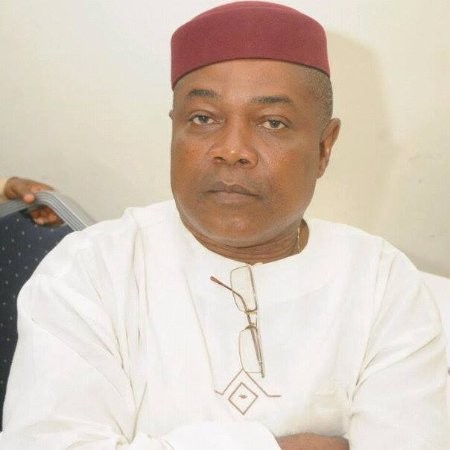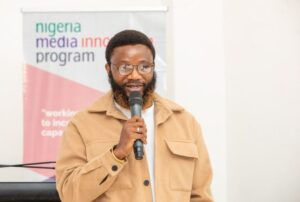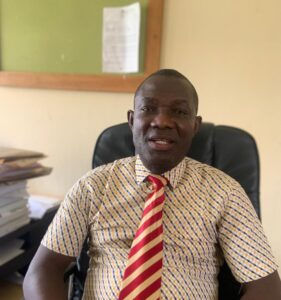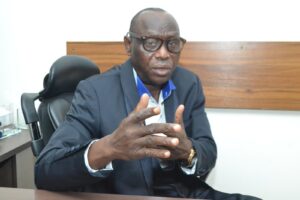Mr. Olisa Egbunike, a veteran Nigerian journalist was former Assistant-Editor-In-Chief of the News Agency of Nigeria (NAN) and Editor of the Independent Newspaper. He was also Group General Manager of the Daily Times Nigeria. In this interview, he spoke on his journalism career, the media industry and offered advice for journalists and media owners.
Excerpt below:
Having worked with News Agency of Nigeria, Daily Independent and Daily Times, what else are you doing now to keep yourself occupied?
Well, let me say that first and foremost, I am not retired as a journalist. I statutorily disengaged from the News Agency of Nigeria.
From my understanding of journalism, I only shifted focus by becoming a freelance journalist, human capacity developer in the industry, and consultant.
As a financial journalist, I write for some media organizations locally and internationally. On a permanent basis, I am an Executive Editor with GLOBAL BUSINESS ADVOCATE, a Lagos-based business magazine.
Based on your experience, what is your advice for journalists on how to prepare for retirement or exit from top management positions?
What actually is your beef with retirement? What should occupy you as a Journalist is the grace of good health and the opportunity to utilize the foundation you laid before your disengagement from any medium.
In most cases some of us joined the bandwagon in accepting that journalism does not have a second value. I completely distance myself from that group.
What matters most is your ability to identify your biggest niche in the industry and create an innovative platform for your contacts to buy-in.
Specifically, there is no hard and fast rule about disengagement. The truth is that disengagement will surely compel any right-thinking journalist to seek or create a window for sustainable wealth.
Having worked in both government and privately owned medium, what were your experience(s)?
As a journalist with more than forty years of experience, I will say that practically there is no difference because news remains news.
What actually is your beef with retirement? What should occupy you as a Journalist is the grace of good health and the opportunity to utilise the foundation you laid before your disengagement from any medium.
In most cases, some of us joined the bandwagon in accepting that Journalism does not have a second value.
I completely distance myself from that group. What matters most is your ability to identify your biggest niche in the industry and create an innovative platform for your contacts to buy-in.
Specifically, there is no hard and fast rule about disengagement. The truth is that disengagement will surely compel any right-thinking journalist to seek or create a window for sustainable wealth.
Generally, what people might term the difference is hedged on the approach toward news. I must say also that the approach toward news in our clime stemmed from the concept of an emerging economy.
On the other hand, the government to a large extent conceptualized news as a social service with its attendant budgetary constraints while private media in upholding the social service components of news laced it deeply as a growing business concern and associated profit.
What all these mean, is that while private-owned media with its profits invest heavily to meet the dynamics of our time in newsgathering, processes, and dissemination, the government-owned medium stagnates on account of budgetary constraints.
In all Journalists, the news is the same. Private media are heavily empowered while government-controlled media are seriously disadvantaged.
What have been the major highlights of your journalism career and your advice for younger colleagues on how to make a success of their career?
I must say that journalism has made a tremendous impact on my life. First, it provided me the opportunity to know and understand the world, particularly Nigeria and Africa.
I have been to all the 36 states in Nigeria and Abuja. I equally, within the span of my career, visited 42 foreign countries. As a Financial Journalist, the most important aspect of my career remains my exposure to national, continental, and global economies.
The exposure in covering, particularly money and capital market further leverage my insight into global economic disequilibrium.
On the other hand, my candid advice will only be that journalists must aspire to be participant observers by acquiring the knowledge in their beat to become authorities. The rest will follow.
Some Journalists have regrets about opting for the profession. Are you happy you did and proud of the profession?
As a professional journalist, I am very happy because of the knowledge I acquired through journalism. I will not have been OLISA EGBUNIKE that I am today without journalism.
Although happiness is relative, from my comfort zone I am happy. I think the source of regrets by some of my colleagues stemmed primarily from their inability to harness opportunities they encountered in the course of their careers.
What is your assessment of the present practice of journalism compared with the past and your suggestion for improvement?
My assessment of the profession is that journalism has leapfrogged particularly with the array of equipment that aids the practice.
My major concern is human resources. I notice that despite an avalanche of university-educated manpower in the industry, the quality of news content, research and presentation has fallen compared with the past. Many reporters are not committed to the job, hence their poor knowledge about issues and skills to investigate.
Equally, most editors’ are just nominal as they lack the capacity to motivate reporters and provide necessary directions.
My suggestion toward improving the industry lies in the training and retraining of both the reporters and editors.
The industry will equally grow with conscious effort in encouraging specialization by reporters and editors. In the NAN of Yore, my experience was that the knowledge and understanding of those covering economy, judiciary, politics, and sports make it nearly impossible to controvert news items. They exhibited specialization and skilled management of news from contiguous areas of human endeavors.
What is your advice to media owners on the condition of service to ensure maximum productivity?
Condition of service in the nation’s media industry has remained a hydra-headed issue. As a former Secretary of the Lagos State Council of the Nigerian Union of Journalists (NUJ), we negotiated with various media owners without success more than 28 years ago.
Even under Senator Smart ‘sAdeyemi’s leadership of the NUJ, the union focused on government-owned media and met stonewalls.
As a financial journalist, I will say that the problem is a national problem that follows the inability of the government to implement and review labour laws to meet the challenges of current realities.
Media owners will only implement dynamic conditions of service if and when the leadership of the nation demonstrates enough political will to implement Labour laws and do justice to Nigerian workers.
Any advice on survival strategies for media organizations, considering the economic challenges many of them are going through?
In a depressed economy, the media industry is always the first to witness an economic downturn. The reason primarily is because in the developed world the media depend totally on adverts to survive. In developed clime, the media as a going concern diversify its activities by investing in order businesses to shore up their revenue.
As a capital-intensive business, Nigerian media must diversify their operations by investing.
It’s not new to Nigeria because Daily Times then survived by investing in the commercial press, real estate, and entertainment among others. Equally considering our peculiar economic challenges media houses must think out of the box by creating new Windows of generating revenue.
We did it at the Daily Times, using classified adverts and we witnessed a jump from N89,000 to about N520,000 per day and targeting N1million per day. They must also look at the issue of overhead and understand multi-tasking. In short, the media need serious overhauling of their operations within the economy to break even.
Any other issue you want to comment on?
As a reporter, Editor, and Media Manager, my first comment is on media owners’ lack of investment in journalists.
The issue of lack of training caught across government and privately-owned media. The dynamism in humanity and the evolving nature of the world necessitated the need for constant training and retraining.
The media will only grow and enhance its capacity and productivity based on the quality of the media industry manpower across the board.
Specifically, journalists must also be encouraged to contribute to the business side of the media as they interact daily with numerous stakeholders.






